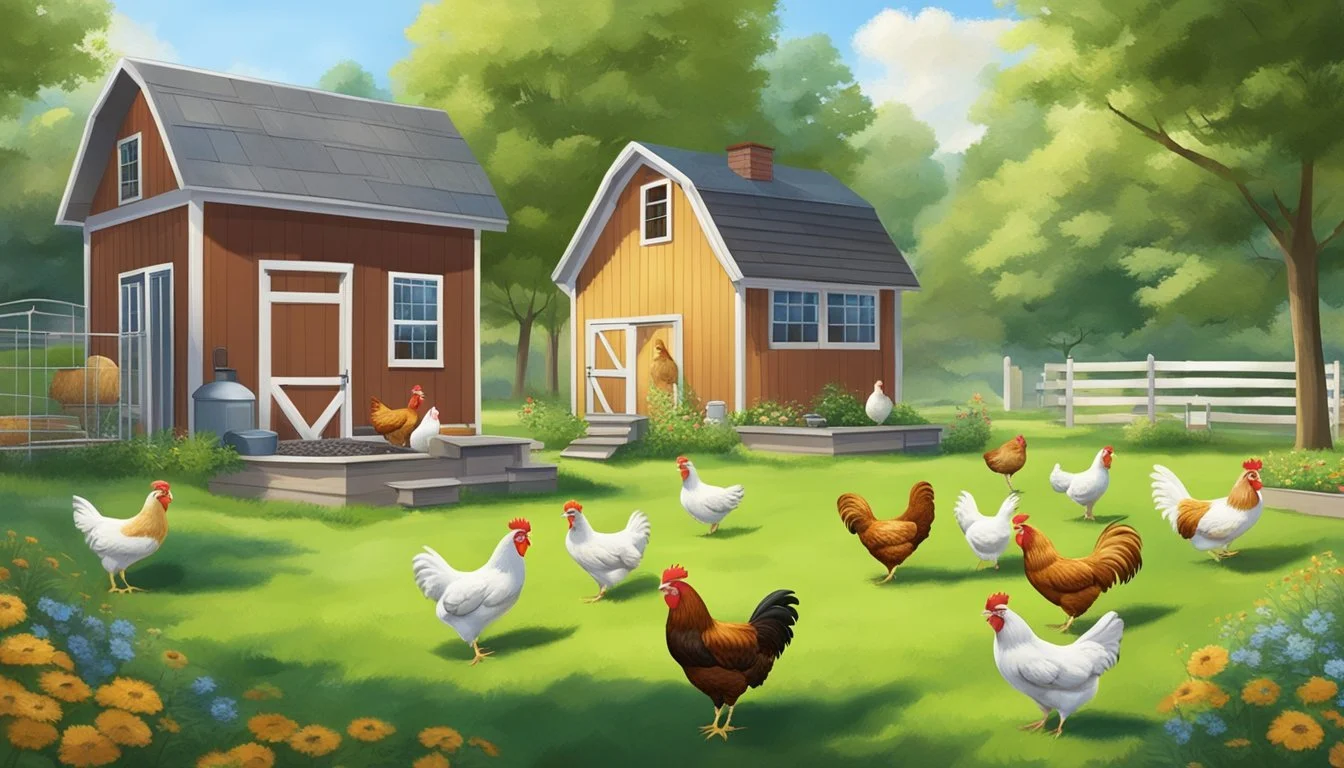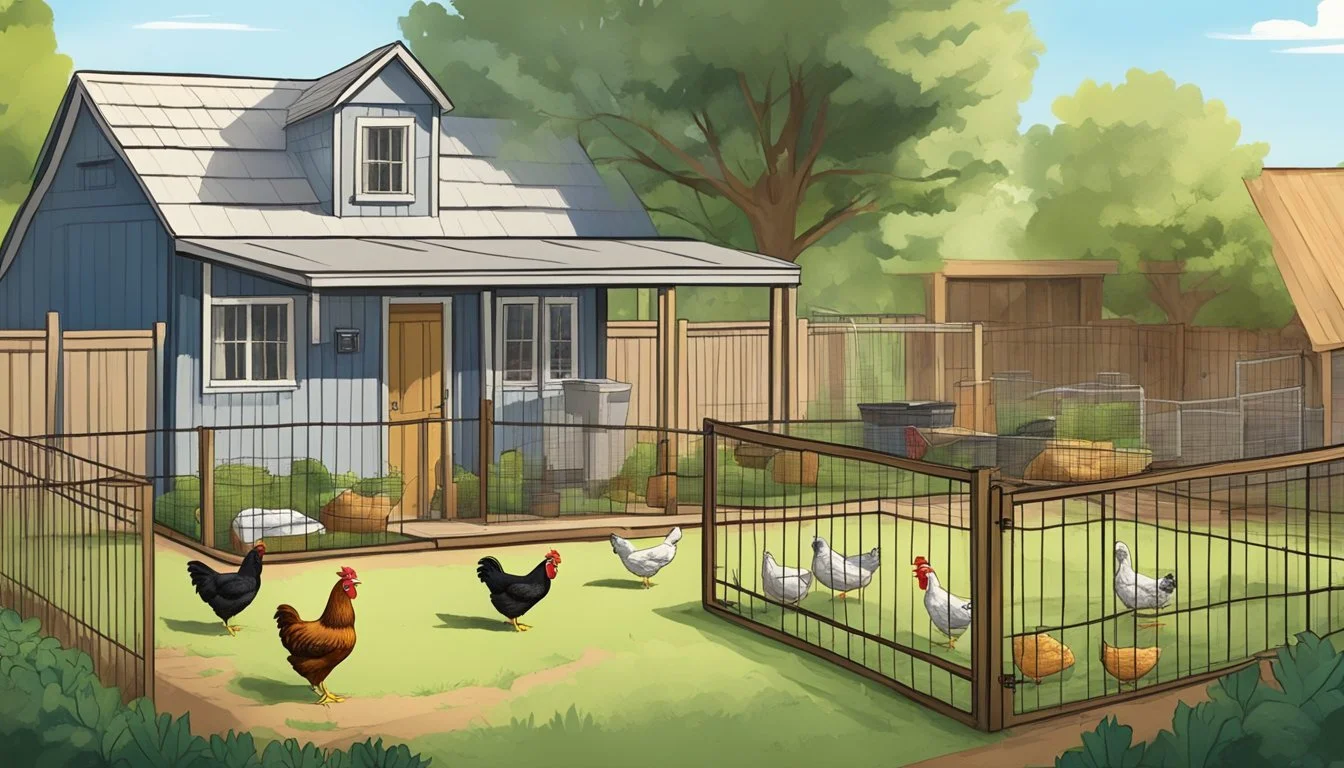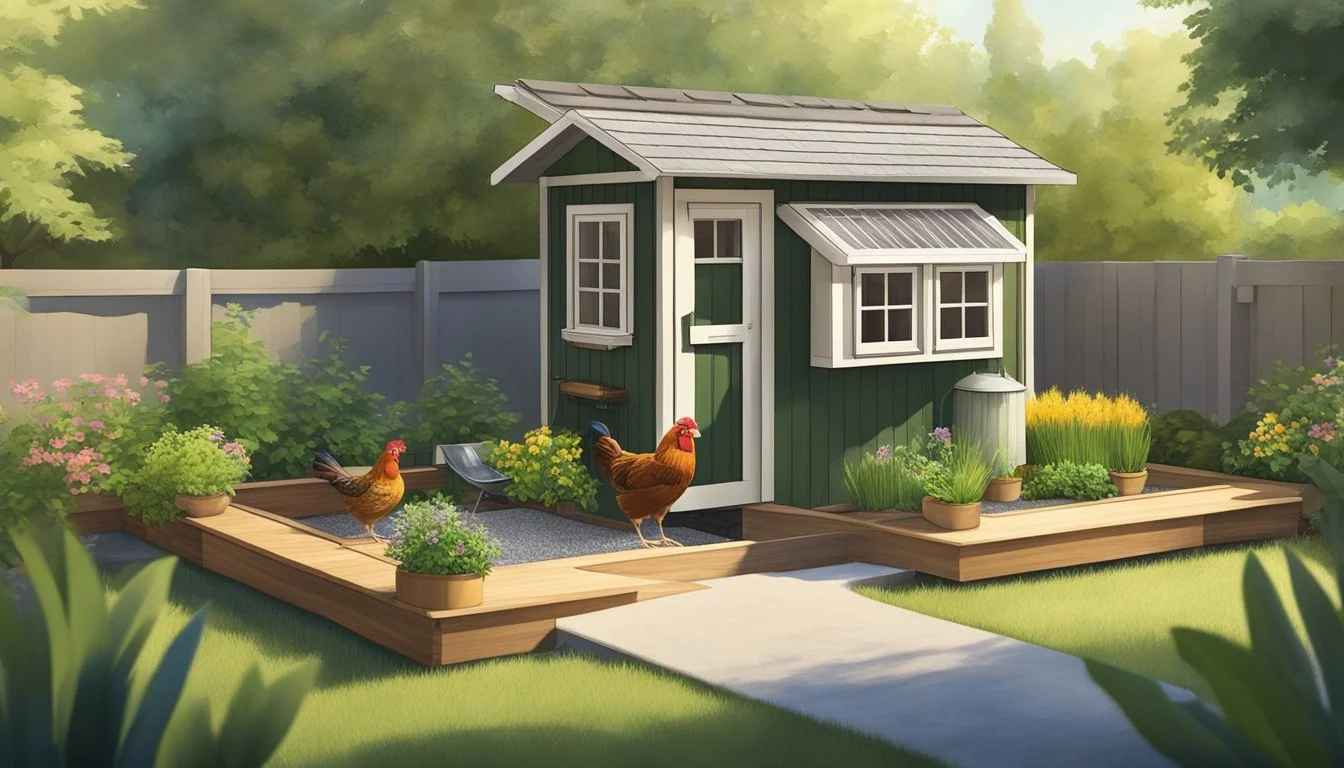Keeping Backyard Chickens in Dallas, TX
Essential Tips for Urban Poultry Farming
Keeping backyard chickens has become an appealing endeavor for many residents in Dallas, Texas. The trend towards urban agriculture and self-sufficiency has seen a rise in the number of city dwellers turning their backyards into mini-farms. Chickens, in particular, are a popular choice due to their dual role as a source of fresh eggs and as a natural method for pest control. In Dallas, the laws permit residents to keep chickens, offering people the opportunity to engage in this sustainable practice, though they must do so within the boundaries of the city's regulations.
Raising backyard chickens requires adherence to specific ordinances to ensure the well-being of the animals and the community. In Dallas, while chickens are allowed, the presence of roosters is prohibited except in areas zoned for agricultural production. This is a measure to minimize noise disruptions within residential areas. The exact number of chickens that residents can keep is not specified, but maintaining a clean, odor-free, and noise-minimal environment is essential to avoid complaints that could lead to enforcement actions.
Aspiring chicken keepers in Dallas should familiarize themselves with the relevant local laws and acquire the necessary knowledge for proper chicken care. Prospective chicken owners must consider coop construction, predator protection, and adequate space for their birds to roam. Understanding and complying with these regulations ensures that raising backyard chickens is a rewarding and positive experience.
Understanding Local Chicken Laws
Residents of Dallas, TX interested in raising backyard chickens must navigate a series of local regulations to ensure their activities remain within legal boundaries.
City Ordinances and Regulations
Dallas city ordinances play a crucial role in governing the keeping of backyard chickens. Individuals must refer to these laws to understand what is permissible within the city limits. It's important to recognize that while chickens are allowed, roosters are prohibited due to noise concerns. The Dallas City Code stipulates the conditions under which chickens can be kept to avoid them becoming a nuisance to neighbors.
Permits and Legal Requirements
To keep chickens legally in Dallas, residents may need to obtain a permit from the local authorities. Compliance with local zoning laws is essential, and potential owners should verify whether their property is zoned appropriately for the keeping of chickens. The need for permits can vary based on the number of chickens and the specific locality within Dallas.
Limits and Restrictions
While Dallas permits the keeping of chickens, there are restrictions to consider:
Number of Chickens: The exact number of chickens allowed is not specified in the general ordinance but may be regulated by zoning laws.
Distance Requirements: Coops and chickens must be kept a certain distance from the property line and adjacent property lines to minimize disturbances.
Nuisance: Chickens should not cause a nuisance to neighbors, and any violation of this could result in fines or other penalties.
Owners should contact local authorities regarding any updates or changes to these ordinances.
Setting Up Your Chicken Coop
Before bringing chickens into your Dallas backyard, it's imperative to set up a coop that adheres to local chicken laws, provides comfort, and ensures safety.
Coop Construction and Placement
The construction of your chicken coop should meet specific city regulations and be placed thoughtfully within your property. In Dallas, TX, the coop must be kept a certain distance from neighborhood dwellings, specifically at least 20 feet from your property line, and a greater distance from schools and churches to avoid nuisances. It is vital to choose a location that facilitates easy cleaning, maintains good drainage to prevent water accumulation, and is shaded to protect from the Texas heat.
Providing Adequate Shelter and Space
Your chickens will demand both shelter and space. Inside the coop, provide at least 3 to 4 square feet per chicken to allow for comfortable exercise and movement. The coop should cater to backyard chickens' behavioral needs with perches for roosting and nesting boxes for laying eggs. Make sure it is well-ventilated to prevent the buildup of ammonia and bacteria while keeping out the extremes of Texas weather.
Safety and Protection From Pests
Securing the coop against pests and predators is critical. Use sturdy materials like hardware cloth rather than chicken wire to seal all openings, as it offers more resistance to invaders. Remember to dig a trench around the coop's perimeter and bury the cloth to prevent digging by predators. Regular cleaning of the coop reduces the attraction of pests and maintains a healthy environment, preventing the spread of bacteria and diseases. It's a balance between providing ample ventilation and ensuring that the enclosure prevents unwanted access from wildlife and stray animals.
Feeding and Caring for Your Chickens
Caring for backyard chickens in Dallas requires a comprehensive approach to nutrition, healthcare, and understanding the specifics of various chicken breeds for optimal egg production.
Nutrition and Water
Nutrition: A balanced diet is crucial for the health of backyard chickens. They should be fed a high-quality poultry pellet as their main diet, which provides a balanced intake of proteins, vitamins, and minerals. Supplementing with grains, such as corn or wheat, can be beneficial, but should not exceed 10% of their overall diet. Additionally, kitchen scraps like fruits and vegetables can be offered sparingly as treats.
Proteins: Essential for growth and egg production.
Calcium: Required for strong eggshells.
Grit: Helps chickens digest their food.
Water: Fresh, clean water must be available at all times. Water containers should be regularly cleaned and positioned in the shade to prevent algae growth.
Healthcare and Disease Prevention
Healthcare: Regular health checks are important to catch and treat any potential issues early. Chickens should be inspected for signs of distress, parasites, or illness. A clean environment and coop help prevent the outbreak and spread of diseases.
Vaccinations: Some vaccines may be necessary depending on local disease threats.
Parasite Control: Routine deworming and anti-parasitic treatments are important.
Disease Prevention: Quarantine new birds before introducing them to your flock to prevent disease transmission. Additionally, educate yourself on common chicken diseases and work with a veterinarian knowledgeable in poultry health to develop a health management plan.
Chicken Breeds and Egg Production
Breeds: Selecting the right breeds affects egg production. Layer breeds like the Rhode Island Red and Leghorn are preferred for their high yield of eggs. The climate in Dallas is suitable for most breeds, but heat tolerance should be considered.
Layer Breeds: Known for high egg output.
Dual-Purpose Breeds: Good for eggs and meat.
Egg Production: Hens typically begin laying eggs at about six months of age and have varying production rates depending on the breed. Consistent light, proper nutrition, and a stress-free environment contribute to steady egg-laying.
Lighting: At least 14 hours of light per day can encourage laying.
Stress Factors: Minimize changes in the flock's environment to avoid disruption in laying.
Being a Good Neighbor With Backyard Chickens
Keeping backyard chickens in Dallas requires adhering to local ordinances and maintaining neighborly relations by effectively managing noise, odor, and waste.
Managing Noise and Odor
Noise: To reduce noise, residents should not keep roosters, as they are prohibited by Dallas city ordinances due to their loud crowing, which can disturb the peace within neighborhoods. Hens are typically quieter, but they can still create noise, which should be minimized to avoid causing a nuisance to neighbors.
Odor: Maintaining sanitary conditions in the coop and run area is crucial for controlling odors that could become a nuisance. Regularly removing droppings and refreshing bedding materials will help keep odors in check.
Waste Handling and Sanitation
Waste: Chicken owners in Dallas must establish a routine waste disposal system to prevent waste accumulation, which can lead to unsanitary conditions and offend neighboring residences. Composting chicken waste can be an effective method of recycling nutrients back into one's garden, given it is managed properly and kept away from property lines to minimize impact on the community.
Sanitation: The coop and run should be kept in a clean, orderly state to prevent attracting pests and to ensure a healthy environment for both chickens and humans. Ensuring proper ventilation and dry bedding will contribute to a sanitary coop.
Community Engagement
Communication: Residents are encouraged to engage in open dialogue with their neighbors to address any concerns regarding their backyard chickens. This fosters a sense of community and allows for proactive solutions in case issues arise.
Community Practices: Sharing surplus eggs and educating interested neighbors about the benefits of backyard chickens can strengthen community bonds and promote a more accepting and supportive environment.
Broader Implications of Urban Chicken Farming
Keeping backyard chickens in Dallas has broader implications on sustainability, animal ethics, and the potential extension to other livestock.
Environmental Considerations
Urban chicken farming presents a notable shift towards self-sufficiency and sustainability in food production. These backyard flocks can contribute to reduced transportation costs and carbon footprints, as families source eggs and possibly meat locally. Moreover, the free-range conditions often seen in urban settings can lead to healthier chickens and reduced need for antibiotics compared to more confined production systems.
Benefits:
Reduced transport emissions.
Lower feed cost due to free-ranging behavior.
Possible concerns:
Proper waste management to prevent soil and water contamination.
Ethics and Animal Production
The rise of backyard chickens has thrown a spotlight on the ethics involved in animal production. Owners tend to have a direct connection with their chickens, leading to potentially better welfare conditions compared to industrial settings. However, questions regarding slaughter practices arise, as not all backyard chicken owners are prepared or knowledgeable about humane methods.
Considerations:
Humane treatment of chickens, including adequate space, nutrition, and medical care.
Ethical responsibilities of owners during end-of-life decisions.
Expansion to Other Fowl and Livestock
The practice of keeping chickens often paves the way for urban residents to consider other forms of livestock like ducks, geese, and turkeys. These animals can contribute to the diversity and resilience of a backyard farm ecosystem. Regulations are crucial here, as larger animals like horses, sheep, and goats have different needs and environmental impacts that must be managed.
Expansion Prospects:
Ducks and geese: Maintain garden health by controlling pests.
Turkeys: Provide additional meat source for families.
Concerns:
Zoning laws governing larger livestock within city limits.
Needs assessments for each type of animal to ensure well-being.
Common Challenges and Solutions
Maintaining the health and well-being of backyard chickens in Dallas involves addressing the twin challenges of predators and disease. Effective strategies can mitigate these risks, ensuring a prosperous flock.
Dealing With Predators and Disease
Predator Management:
Fencing: A sturdy fence at least 6 feet high with a secure top deters climbing and flying predators. Burying the fence at least a foot underground prevents digging animals from gaining entry.
Coop Security: Reinforce chicken coops with hardware cloth instead of chicken wire, which can be easily torn by stronger predators.
Locks: Installing raccoon-proof locks on coop doors thwarts the most intelligent of predators.
Disease Prevention:
Vaccinations and Regular Health Checks: Vaccinate chickens against common diseases and conduct regular health inspections for early detection of any issues.
Sanitation: Keep coops clean to prevent the buildup of waste, which can attract pests and foster bacteria growth.
Pest Control: Implement measures to control mites, lice, and other pests that can affect the chickens' health.
Biosecurity: Limit exposure to wild birds which can introduce diseases; refrain from visiting other poultry farms to avoid cross-contamination.
By adhering to these practices, owners can significantly reduce the prevalence of predator attacks and disease within their backyard flocks.








